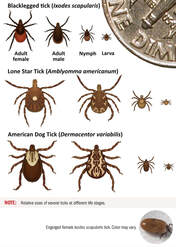 Spring is around the corner, so keep your pet safe from ticks and tick-borne illnesses! Our dogs and outdoor cats are also exposed to plenty of pesky parasites, such as ticks and the diseases they carry. The are 3 main type of ticks in Burlington, MA: Deer Ticks, an estimated 50-70% of whom carry Lyme disease causing bacteria. Dog Ticks and Lone Star Ticks. At CSAH we strongly recommend using tick preventatives such as Simparica Trio. Some clients double-up with a chewable preventative and a repellent collar like the Soresto Collar. Talk to our veterinarian to determine the best product for your pet given their health history, potential exposure to ticks and lifestyle. Use your preventative all year long! Frost and freezing temps DO NOT kill ticks. Ticks are dormant but come back to life in only 40 degrees - a high often achieved even in the coldest months. After a walk, the American Kennel Association recommends checking for ticks on your pet. Don't forget to look inside ears and between toes, just to make sure your pet didn’t bring any ticks home with them.  What Do I Do If I Find a Tick on My Dog? If you find a tick on your dog, remove it as soon as possible! If it hasn’t attached itself yet, there is no risk of tick-borne illness for your pet. If it has attached, grasp the tick with a pair of tweezers as close to the site of attachment as you can and pull straight back. If you have found an attached tick, particularly one that is engorged, the MSPCA advises noting the date and time to discuss with your veterinarian. Continue watching for the following symptoms*:
Comments are closed.
|
BLOG
|
|
Contact Information:
Cambridge Street Animal Hospital 156 Cambridge St #1B Burlington,MA 01803 (339)234-6007 [email protected] Office Hours: Monday - Friday, 8am-5pm |
Join the PetPress Community!
Sign up for our monthly newsletter, the PetPress for hospital news, pet care tips and cute pet photos! |
